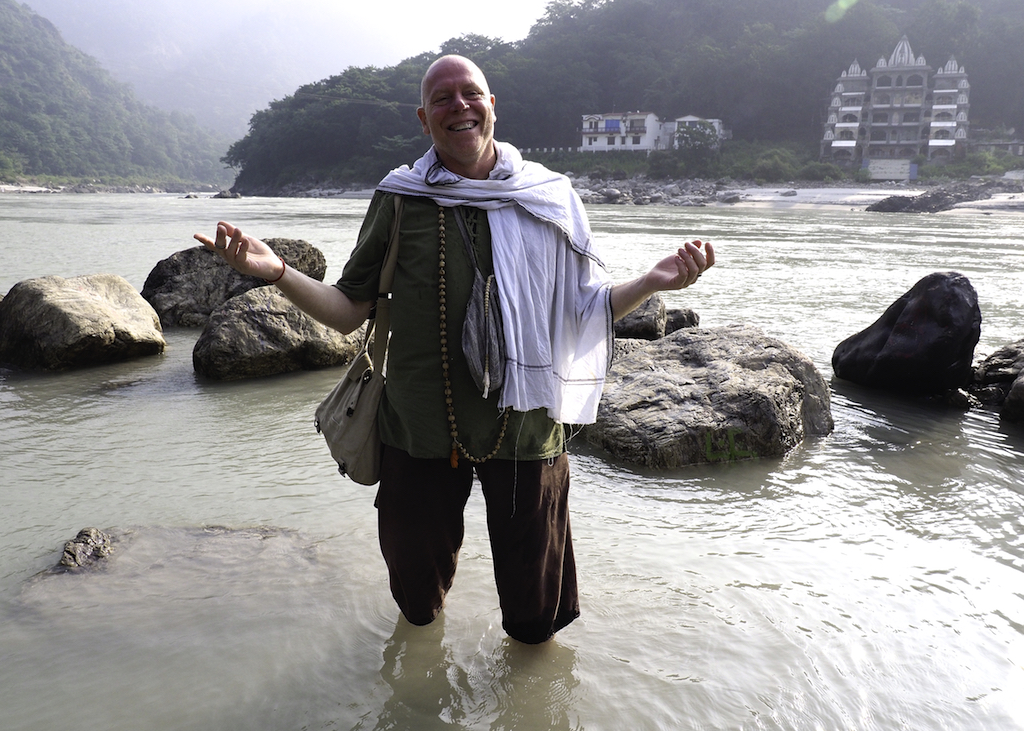Monday Morning Greetings 2017 #42 – Getting Vṛndāvana
Dhanurdhara Swami October 16th, 2017
“I get it Mahārāja! I get it! I get it!” I had stopped by the Bhakti Dham to see off gentle giant Joe Carini from Brooklyn before he left Vṛndāvana after his successful pilgrimage. Those were his last words before he was about to board his taxi. His face was beaming with unabashed joy. You could hear the conviction in his voice. Indeed Joe got Vṛndāvana!

What does getting Vṛndāvana mean? It means seeing and feeling a very special beauty here that touches one’s heart with the joy of devotion like no other place in the world. It is a wonder beyond the veil of disrepair and chaos that too easily covers its glory, and a beatitude felt by those fortunate enough to enter that holy place under the guidance of a Vaiṣṇava who has communicated and inspired them with the proper perspective and mood.
I think no one has better summarized that proper mood needed for “getting” Vṛndāvana than Śrī Narottama, that great 15th century Vaiṣṇava saint:
“When my mind is peaceful and I am free from selfish desires then I will actually see Vṛndāvana.”[1]
Narottama expresses an interesting point about perception that just doesn’t refer to seeing Vṛndāvana, but refers to the perception of all phenomena—that to see something depends not just on the senses, but other factors such as the clarity of one’s mind and the attitude one has.
I thought of an interesting analogy to help one understand Narottama’s contention that seeing things properly, especially Vṛndāvana, refers to more than just sensual perception. Seeing things clearly is like properly capturing an image through the lens of a camera. One requires the right perspective and the proper focus.
The right perspective to see Vṛndāvana is to observe it through the viewpoint of the guide who has already seen Vṛndāvana and can tell and sing about it not only according to what the great saints have described, but also in their mood.
The proper focus to see Vṛndāvana is the clear mind that mystically arises quite effortlessly for one exclusively engaged in pañca aṅga bhakti, the five most potent practices of devotional service, namely chanting the holy name, hearing the stories and philosophy of Krishna, worshipping the Deity, serving the devotees, and visiting the holy places of Krishna’s pastimes. These practices are so powerful according to Śrī Rūpa Gosvāmī that even a neophyte, one who is not highly advanced in devotion, can experience bhāva, the height of devotion, by humbly executing these practices under the guidance of a Vaiṣṇava, what to speak of achieving clarity and focus of the mind.
So in this way, Joe got it. Not only did Joe get it, but the forty-two other pilgrims in his group, which was led by Raghunath, also seemed to get it. You could see it in their faces, their unbounded enthusiasm for kīrtana, and by the gratitude they expressed for being here.
Raghunath did a great job of guiding this group of various levels of devotional commitment. He first prepped them for Vṛndāvana in Hṛṣīkeśa by immersing the group in chanting and hearing about Krishna and by instilling in them the proper mood of a pilgrim. [2] Then in Vṛndāvana he further inspired them to remain committed to a full day of bhakti, especially singing kīrtana and visiting special places of pilgrimage. I think it was not difficult for the group to remain absorbed in devotion here with the awe inspiring 24-hour kīrtana of Śrī Śrī Krishna-Balarama Mandir nearby and the early evening kīrtanas of the renowned Madhava in the courtyard of the MVT gardens where they were staying.
There is world beyond the ordinary eye that is accessible to those with the natural apparatus to perceive it, and that holds true even in the world of matter. For example, there is a high pitch sound made by a whistle that is beyond what humans can hear, but accessible to a dog whose ears are naturally wired for that sound. In a similar way, the sincere pilgrim can no doubt glimpse and feel the spiritual world here in Vṛndāvana when their heart is geared to a mood of service awakened by the holy name under the guidance of a Vaiṣṇava. Yes, like Brooklyn Joe you can also get Vṛndāvana!
[1] Lālasāmayi Prārthana, verse three
[2] To instill in his pilgrimage, group the proper mood Raghunath had his group recite daily the following pledge that he composed:
Foundations of a Successful Pilgrimage by Raghunath
- “I will not criticize”—Refrain from criticism, gossiping. Criticism=sadness
- “I will be tolerant”—I will stop blaming things, circumstances, or other people for my shortcomings. “I cannot blame myself to a better future”, when I complain I make a contract to be unhappy”
- “I take no offense”—A practice of NOT compiling others’ but accepting circumstances as God’; forgiving completely and immediately if one offends.
- “I am always ready to ask forgiveness for MY offenses”—A practice of humility
- “I will find the good in others and let them know it”—A practice of noticing other people’s good qualities and giving respect to others.
- “I will keep a tally of my blessings”—Practicing gratitude.
- Monday Morning Greetings
- Comments(0)